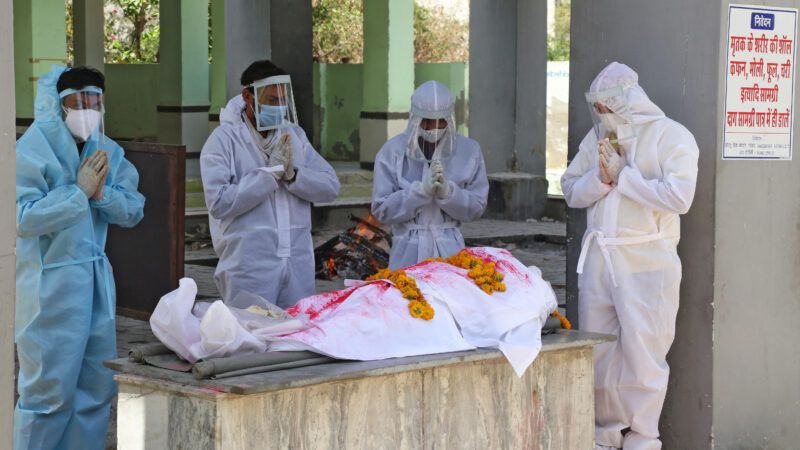After Thousands Die Unnecessarily, the U.S. Agrees to Let India Have Its AstraZeneca Vaccines
But only after the company jumps over more regulatory hurdles.

The Biden administration announced Sunday that it will send assistance to India, a country whose COVID-19 daily case rate has exceeded a record-setting 350,000 cases. Reports from the country are horrifying: Many hospitals' oxygen supply has all but run out, and they are being forced to turn away dying patients.
"The United States has identified sources of specific raw material urgently required for Indian manufacture of the Covishield vaccine that will immediately be made available for India," said National Security Council spokesperson Emily Horne in a press release Sunday. "The U.S. Development Finance Corporation (DFC) is funding a substantial expansion of manufacturing capability for BioE, the vaccine manufacturer in India, enabling BioE to ramp up to produce at least 1 billion doses of COVID-19 vaccines by the end of 2022."
Now the administration is adding an item to that list. Millions of AstraZeneca doses are currently collecting dust in the U.S. because the regulatory state has refused to approve the vaccine. "The U.S. will begin sharing its entire pipeline of vaccines from AstraZeneca once the COVID-19 vaccine clear federal safety reviews," the Associated Press reported today after President Joe Biden spoke with Prime Minister Narendra Modi by phone. Up to 60 million doses were expected to head that way.
It's good to see them finally put to use. But that still raises the question: Why has it taken so long for the Food and Drug Administration (FDA) to approve this vaccine, which has already been deployed in over 70 other countries? Indeed, the vaccine still hasn't been approved here—and India won't get those shots until it is, even though the majority of the developed world accomplished this months ago.
The United Kingdom and many countries in the European Union rolled out AstraZeneca in December. But the FDA demanded to see results from a large-scale trial, even though the vaccine had already been shown to work around the globe. The company did just that on March 24, reporting that the shots are 76 percent effective at stopping symptomatic cases of COVID-19. And yet those life-saving doses have continued to pile up in the U.S. without going into people's arms, because AstraZeneca has not yet finished jumping through the many hurdles required by the FDA's application process.
"This is nearly indefensible," wrote Reason's Eric Boehm last month. "On the long list of ways that the government has screwed up the COVID-19 response, hoarding lifesaving vaccines that it won't allow to be used deserves a place at or near the very top."
Public perception of the vaccine and its approval received no favors in mid-March, just days before the company released their Phase III trial data, when a group of European countries temporarily barred the use of the vaccine over a rare blood-clotting side effect. Seventeen million people had received the vaccine, and 37 developed the reaction—a 0.0002 percent chance. Regulators realized their error and reversed course, noting that the chance of death from the coronavirus is perhaps a more pressing concern.
That didn't come without a cost. "Earlier this month, a Harris Poll in France found that just 43 percent of respondents trusted the AZ vaccine," reported Reason's Ron Bailey in March. "A new poll by the Elabe Institute, published Tuesday, shows only 20 percent of the French people trusting the vaccine."
But people in India are being killed at alarming rates. The country saw more than 2,800 COVID deaths yesterday, an enormous spike from previous levels. They do not have the luxury of being so cautious. Whether they receive the vaccine should be left up to the judgment of each individual, and they should have that choice—now.


Show Comments (47)